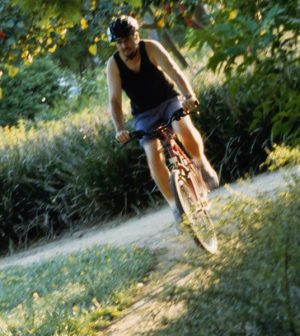- Could Your Grocery Store Meat Be Causing Recurring UTIs?
- Are You Making This Expensive Thermostat Error This Winter?
- Recognizing the Signs of Hypothyroidism
- 10 Strategies to Overcome Insomnia
- Could Artificial Sweeteners Be Aging the Brain Faster?
- Techniques for Soothing Your Nervous System
- Does the Water in Your House Smell Funny? Here’s Why
- Can a Daily Dose of Apple Cider Vinegar Actually Aid Weight Loss?
- 6 Health Beverages That Can Actually Spike Your Blood Sugar
- Treatment Options for Social Anxiety Disorder
Can’t Work Out During the Week? ‘Weekend Warriors’ Still Benefit

Daily exercise may be the ideal, but even weekend workouts might prolong your life, a new study suggests.
In a study of more than 3,400 men and women over age 40, researchers found those who exercised one or two days a week had the same low death rates as those who exercised more frequently.
“One of the main concerns to increasing physical activity is limited time, particularly multiple days a week,” said lead researcher Eric Shiroma. He’s a staff scientist and epidemiologist at the U.S. National Institute on Aging.
At the study’s start, participants wore activity monitors for a week. The researchers classified them as “weekend warriors” if they exercised only one or two days a week, or as regularly active folks who spread their exercise out over the week. All were tracked for about six years.
Although the regular exercisers had about 50% more moderate and vigorous workouts than the weekend exercisers, the health benefits were similar.
“We found that weekend warriors had a similar mortality benefit compared to more frequent exercisers,” Shiroma said.
The weekend warriors had health benefits similar to those who met goals set out in the Physical Activity Guidelines for Americans — at least 150 to 300 minutes of moderate-to-vigorous activity a week, he said.
However, this study can’t prove that it was exercise that reduced death rates, said Dr. David Katz, director of Yale University’s Yale-Griffin Prevention Research Center.
“Does exercising on weekends reduce mortality, or are healthier individuals with lower near-term mortality risk more likely to have the energy and inclination to be physically active for recreation?” Katz asked. “The likelihood is that both are true.”
Other studies have found similar results, said Katz, who wasn’t involved in this new research. All physical activity is good physical activity, whether done throughout the week or clustered into a weekend, he added.
“Being active, and whenever your routine permits, will almost certainly wind up making you healthier and more vital,” Katz said.
The findings support the importance of exercise in staying alive longer, said Samantha Heller, a senior clinical nutritionist and exercise physiologist at NYU Langone Health in New York City. “But regular exercise does a lot more than keep us alive.”
Regular exercise improves sleep, blood pressure, mental function, bone health, muscle strength and heart health, she said. It also reduces the risk of certain cancers, heart disease, type 2 diabetes and anxiety, she noted.
“The issue is how to motivate people who are sedentary to get their fannies moving,” said Heller, who wasn’t involved in the study.
Being a weekend warrior is good for those with busy work weeks. It is important, however, to note that long days of sitting have adverse effects on health, she said.
The recommendations to achieve optimal health benefits vary depending on one’s goals. Ideally, “we should aim for a minimum of 30-60 minutes [daily] five days a week, or 25-50 minutes [daily] six days a week,” Heller said.
Schedule exercise in your calendar, Heller recommended. “If you wait to find the time, it will never happen.”
If you sit all day, set an alarm to get up and move every hour or so, Heller advised. Take a few minutes to do knee lifts, jumping jacks, stretches, arm swings, walk around the block or use stairs, Heller said. “Encourage your colleagues to join you,” she added.
“Exercise should be as much a part of your daily routine as brushing teeth or eating a meal,” Heller said.
The report was published in April in the Journal Medicine & Science in Sports & Exercise.
More information
The U.S. National Library of Medicine offers more information on exercise.
Source: HealthDay
Copyright © 2026 HealthDay. All rights reserved.










